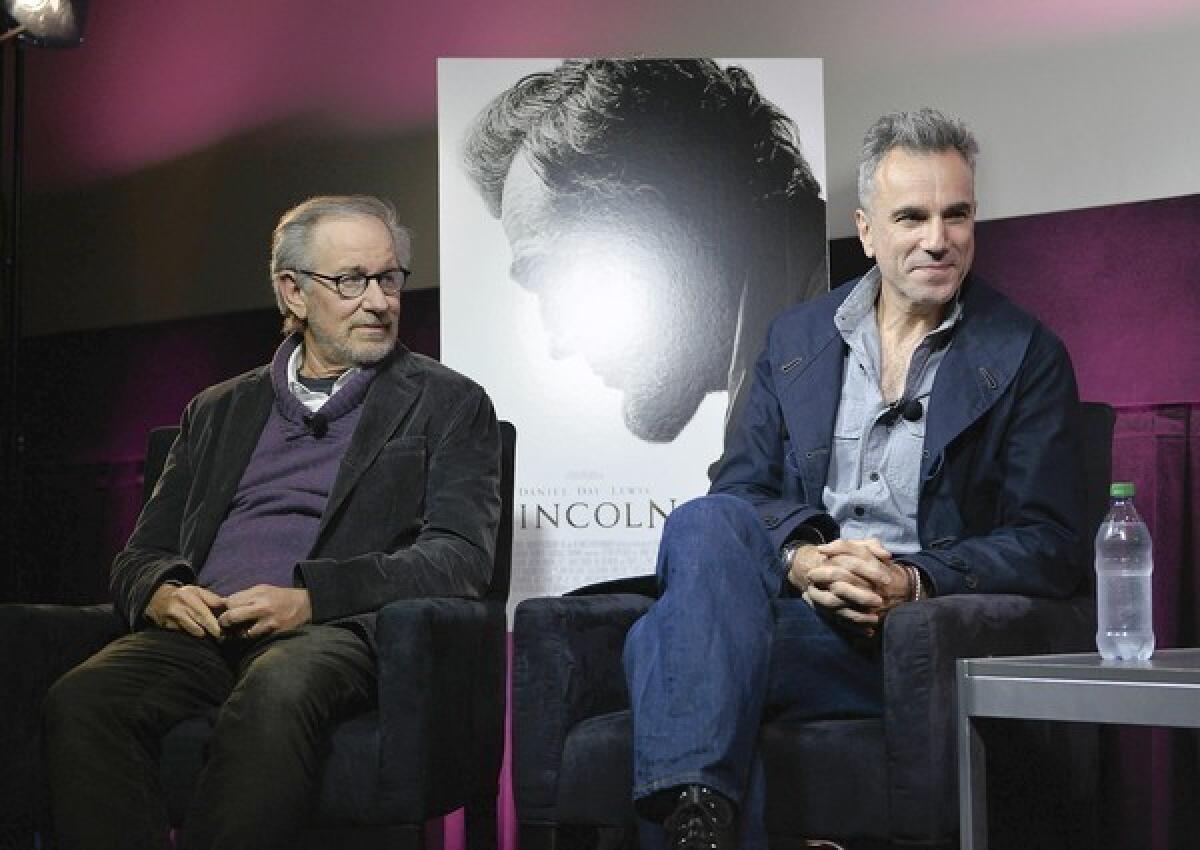Looking for political meanings in films during election time

Steven Spielberg knows the dust that can be kicked up when Hollywood takes up political themes in the weeks before a closely contested presidential election.
So the veteran director didn’t take any chances with his new “Lincoln” movie, pushing back the release until the weekend after the Tuesday election.
“The movie coming out after the election gives the film at least a chance to stand on its own,” Spielberg said in an interview. The filmmaker said he wanted the historical drama to be viewed in the context of its own time, not the present.
With Democratic incumbent Barack Obama and Republican challenger Mitt Romney locked in a close race, partisans on both sides are looking for hidden propaganda from the entertainment industry, which enjoys a cultural prominence like few others.
Some political moves are overt. Clint Eastwood, who squared off against an empty chair at the Republican National Convention, made a commercial on behalf of GOP candidate Romney last week. Barbra Streisand, an icon of the Hollywood liberal elite, recently put out an “emergency” fundraising appeal for Obama.
In other cases, claims of Hollywood politicking are open to debate.
PHOTOS: Lessons from the campaign trail on film
Some Obama foes are voicing suspicions over the content and broadcast date of “SEAL Team Six,” a new film backed by liberal mogul Harvey Weinstein that chronicles the Navy strike team that pursued and killed Osama bin Laden.
The film is slated to air on National Geographic Channel on Sunday and be available the next day on Netflix, which is just one day before the election.
In an article last week, the New York Times reported that “some of the Obama moments [in the film] were added at the suggestion of Mr. Weinstein” — triggering criticism that Weinstein was essentially giving Obama a free ad.
“The fact that they are releasing it two days before the election and editing the film to add the president — of course it’s political,” said Gerald Molen, an executive producer of the anti-Obama documentary “2016: Obama’s America.”
Weinstein disputes any such intent, saying Obama was included because of the crucial role he played in green-lighting the raid.
“If people think the president is a hero in the movie, that’s because he is. If they think he isn’t, that’s their interpretation,” Weinstein said in an interview. “Joe Biden was against [the raid] and that’s in the movie too.”
In a separate interview, director John Stockwell said Obama footage wasn’t included originally because it wasn’t in the film’s budget.
“There was always an element of Obama in it, but we couldn’t afford to buy the footage we wanted from the White House or the battlefield in Afghanistan until the Weinsteins got involved,” Stockwell said. “Harvey gave us the resources to do that.”
The National Geographic Channel, meanwhile, is owned by News Corp., whose chief Rupert Murdoch has been an outspoken supporter of conservative causes. A News Corp. spokeswoman did not respond to an email seeking comment.
This is hardly the first political spat for Hollywood. In 2004, Michael Moore’s anti-George W. Bush film “Fahrenheit 9/11” was released amid the heat of the presidential campaign, spurring conservative complaints that entertainment industry liberals were using their resources to try to tilt the election toward Democratic nominee John Kerry.
The film became a hit, grossing $119 million at the box office — but Kerry nevertheless lost the election to GOP incumbent Bush. Screenwriter Aaron Sorkin, who often takes up political themes in his work, has made no secret of his left-wing leanings in works such as “The West Wing,” “The American President,” and his most recent HBO series, “The Newsroom.”
The people running Hollywood studios tend to support Democrats. DreamWorks Animation Chief Executive Jeffrey Katzenberg, for example, hosted a fundraiser at George Clooney’s house in May that raised nearly $15 million for Obama’s re-election effort. But the entertainment industry also includes some prominent right-leaning voices, including Eastwood, “The View” cohost Elisabeth Hasselbeck, and TV tough guys Chuck Norris and Tom Selleck.
There’s no doubt that the entertainment industry can help attract attention for a presidential candidate. But others say that, despite all the sound and fury, Hollywood’s role in any election is probably tangential at best.
Marty Kaplan, a USC professor who once worked for former Democratic White House contender Walter Mondale, called the SEALs film a “brilliant” ploy by Weinstein, who’s as well-known for his marketing prowess as for his tendency to meddle in last-minute creative decisions.
If not for the controversy, “people wouldn’t be talking about it,” Kaplan said of “SEAL Team Six.” “But as for any impact on the voter? The chances are pretty slim.”
That’s especially true given the competition: Any would-be Hollywood Svengali has to compete with the realities of the massive political war chests of 2012. This election cycle will see an estimated $3 billion in local TV ads alone, according to Kantar Media — plenty to counter the influence of TV and film celebrities.
What’s more, an entertainment figure can quickly turn into a liability, even an embarrassment. Romney, who personally picked Eastwood to deliver the RNC speech, discovered that the hard way when his debate with an empty chair was mocked by TV comedians.
And this week Donald Trump, among Obama’s highest-profile critics, became the butt of jokes when he offered $5 million to charity if the president would hand over his passport and college records. “The Tonight Show With Jay Leno” drew passionate applause from its studio audience with a computer-generated skit that appeared to show the real-estate icon and “Celebrity Apprentice” boss being hurled through a high-rise window to the street below.
Some experts say that that the benefits of free exposure from celebrities are still worth the risks. When Bruce Springsteen went to Ohio — a key swing state – to endorse Obama this month, scores of stories resulted online and on TV. That amounted to free advertising for the president’s campaign.
PHOTOS: Lessons from the campaign trail on film
“Free media is still huge,” said Jeffrey McCall, a media professor at DePauw University. “Free media is viewed as more legitimate by average voters than are campaign ads. Obama appearing on Leno, ‘The View’ and MTV does more for voters viewing these shows than any ads that might run during those shows. Recent news accounts of Romney’s improving poll numbers do much more to help his campaign than any ads that crow about campaign momentum.
“Paid media is important to establish candidate legitimacy, but campaign ads become noise at a certain point,” McCall added. “Ads keep a candidate’s name in the voters’ short-term memory, but free media in news shows or interview shows can provide dimensions to candidates that ads just can’t.”
All of which may be true. But it says something about the current partisan divide that America’s most famous director thinks it’s too risky to release a movie about America’s most famous president during a presidential campaign.
“After the election is over,” Spielberg said, “it’ll be nice to start to share ‘Lincoln’ with the public.”
PHOTOS AND MORE:
VIDEO: A guide to upcoming movies
The Envelope: Awards Insider
PHOTOS: NC-17 movies: Ratings explained
More to Read
The biggest entertainment stories
Get our big stories about Hollywood, film, television, music, arts, culture and more right in your inbox as soon as they publish.
You may occasionally receive promotional content from the Los Angeles Times.








